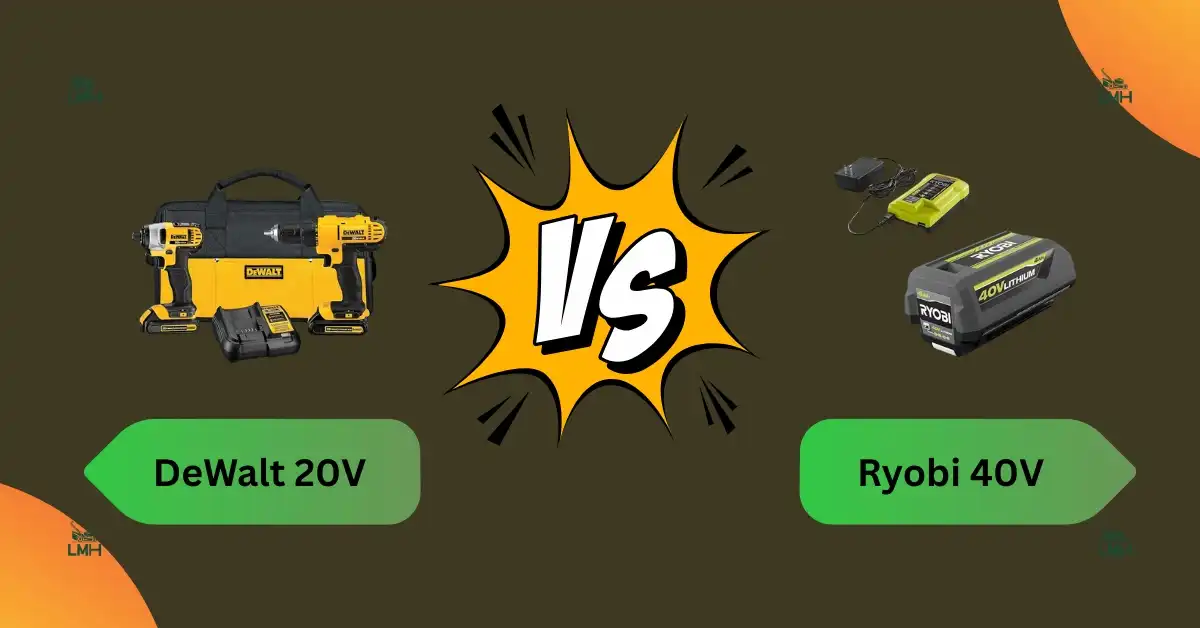DeWalt 20V vs Ryobi 40V Which Feels Stronger

Choosing between DeWalt 20V or Ryobi 40V often comes down to what kind of work you need done. If you want tough, pro-grade tools that hold up well on job sites, DeWalt 20V is a strong fit. But if your focus is longer runtime for yard and outdoor projects, Ryobi 40V has the edge.
In my own use, I’ve found DeWalt to be a steady partner for heavy tasks, while Ryobi feels more like the weekend helper when lawn care or cleanup calls. Both have real value, and your choice depends on whether you need power that lasts all day or tools built for daily precision.
DEWALT 20V
I’ve been using DEWALT 20V tools for a long time. They’ve been with me through small home fixes, weekend DIY builds, and even some heavy projects. Over time, I’ve learned what makes them special, and also where they could be a bit better. This is my honest take, shared like I would with a close friend.
What I Like
I’ve had many tools over the years, but the DEWALT 20V line stands out. Here’s what I enjoy most about using them:
- Strong power for any project – Driving screws into hardwood or drilling into metal feels smooth. The tools save me time and never feel weak.
- Compact and easy to handle – Working in tight corners is no problem. The light weight keeps my arms from getting tired too fast.
- Fast charging and backup batteries – With two batteries, I can swap and keep going. No more waiting around for a charge to finish.
- Trusted brand – DEWALT has been around for years. There’s peace of mind in using tools trusted by both pros and DIY users.
What Could Be Better
No tool is perfect, and DEWALT 20V has a few small areas to grow. Still, these don’t stop me from enjoying them.
- Battery life on bigger jobs – Standard packs drain quicker during big builds. A larger battery option would help even more.
- Price of extra batteries – Official DEWALT packs are strong but a bit pricey compared to others.
- Noise on some tools – The impact driver has a sharp sound. It’s not a dealbreaker, but worth noting if you work indoors often.
These are minor things. For most jobs, the tools perform so well that I hardly notice them.
My Personal Experience
I’ve been using DEWALT 20V tools for more than two years. They’ve helped me with projects in the garage, around the house, and even outdoors. Over time, I’ve seen how the design, performance, and build all come together.
Design
The design feels natural. The grip is easy to hold, even for long hours. The yellow and black color makes it easy to spot in a messy garage. The built-in LED lights have helped me many times when working in darker spots. Small touches like this make a big difference.
Performance
Performance is where DEWALT shines. I’ve driven lag bolts into thick wood and drilled into metal without struggle. The tools respond well, giving me control whether I need speed or finesse. Compared to other brands, DEWALT feels steady and consistent—like a car that reacts just the way you want every time you drive.
Build Quality
The build quality feels tough and reliable. I’ve dropped my drill on concrete more than once, and it still works fine. The batteries lock in with a strong click, and the body feels solid in hand. While no tool is indestructible, DEWALT gives me confidence that I won’t need to replace them anytime soon. It’s the kind of tool line you buy once and count on for years.
Ryobi 40V
I’ve been testing the Ryobi 40V line for a while now, and it has become part of my weekly routine. From mowing to trimming, I rely on it to keep my yard in shape without the noise or smell of gas. It feels like a strong yet simple system that anyone can pick up and use with ease.
What I Like
Over the years, I’ve used different batteries and tools, but the Ryobi 40V system has stood out for a few reasons. Here’s why I enjoy it and how it helps me in my everyday projects:
- Long Run Time – The 40V battery gives me enough power to finish big tasks like mowing my yard without feeling rushed. It feels like having a steady partner that never loses strength halfway through.
- Fade-Free Power – I like that the performance stays strong until the very end of the charge. No slow fade, no frustration—just consistent power.
- Compatibility Across Tools – I only need one battery system for all my Ryobi 40V tools. From my trimmer to the blower, it saves money and space.
- LED Indicator – The battery life indicator helps me plan ahead. I know when it’s time to recharge, which keeps me from getting stuck mid-job.
- Compact Charger – The slim charger with a USB port feels like a nice bonus. I even use it to top up my phone while my battery charges.
What Could Be Better
No product is perfect, and the Ryobi 40V line is no exception. Still, the small things I’ve noticed don’t take away from the overall value. Here’s where I think it could be improved:
- Charger Fit – Sometimes the charger feels a little snug when sliding the battery in. It works fine, but a smoother fit would make it more user-friendly.
- Cord Placement – The cord comes out at an angle that isn’t always convenient. A better design would make wall-mounting and storage easier.
- Charge Time – While it charges reliably, I wouldn’t mind if it were a bit faster. Still, I see it as an opportunity to take a break while the battery gets ready.
My Personal Experience
I’ve been using Ryobi 40V tools and batteries for a couple of years now, and they’ve become an important part of how I manage my yard. What I’ve learned is that this brand is about balance—affordable yet durable, simple yet powerful.
Design
The design of the Ryobi 40V battery system feels thoughtful. The LED light is like a little dashboard that keeps me informed, and the over-molded edges make it tougher than it looks. Compared to older brands I’ve tried, the Ryobi system feels more modern and practical. For the audience, this means less hassle and more focus on the actual work.
Performance
Performance is where the Ryobi 40V really shines. Whether I’m trimming, mowing, or blowing leaves, I get consistent power until the very end. It’s almost like driving a car that never slows down until the gas runs out. This has saved me time and energy, and I think anyone tackling outdoor projects would feel the same relief.
Build Quality
I’ve dropped these batteries more times than I’d like to admit, yet they still work. The build quality feels solid—like a tool that’s built to handle real life, not just showroom tests. I also appreciate that the system has lasted me years with little degradation. For anyone considering the Ryobi 40V lineup, that means investing once and enjoying the benefits for a long time.
Details Comparison: dewalt 20v vs ryobi 40v
I’ve been testing out both DEWALT and RYOBI tools for a while now. Each one shines in its own way. Choosing between them feels like picking between a pickup truck and an SUV. Both get the job done, but in different places. Let’s break it down step by step.
Power & Voltage Performance : dewalt 20v vs ryobi 40v
DEWALT 20V offers a mix of speed and control. RYOBI 40V has more raw power for bigger jobs. Think of it as a sprinter versus a marathon runner. Both strong, but in different styles.
| Feature | DEWALT 20V | RYOBI 40V |
| Voltage | 20V | 40V |
| Torque / Power | 1700 in-lbs torque (drill/impact) | High output for yard tools |
| Best Use | DIY, home, construction | Lawn, garden, outdoor tools |
Rating:
DEWALT 8.5/10
RYOBI 9/10
Tool Type & Usage Purpose : dewalt 20v vs ryobi 40v
DEWALT is best for drills, drivers, and indoor tasks. RYOBI 40V is built for outdoor gear like mowers and blowers. DEWALT feels like a workshop tool. RYOBI feels like a yard partner.
| Feature | DEWALT 20V | RYOBI 40V |
| Tool Focus | Drills, drivers, saws | Mowers, blowers, trimmers |
| Versatility | Indoor projects | Outdoor projects |
Rating:
DEWALT 9/10
RYOBI 8.5/10
Battery Capacity & Runtime : dewalt 20v vs ryobi 40v
Here RYOBI pulls ahead. The 4.0 Ah battery lasts longer. DEWALT’s kit has 1.3 Ah packs. They work, but you may need to swap them out often.
| Feature | DEWALT 20V | RYOBI 40V |
| Capacity | 1.3 Ah (included) | 4.0 Ah |
| Runtime | Short to medium | Long, extended jobs |
Rating:
DEWALT 7.5/10
RYOBI 9/10
Charging Speed & Efficiency : dewalt 20v vs ryobi 40v
DEWALT charges fast and keeps downtime short. RYOBI works but reviews are mixed. Some say it charges quick. Others say it takes hours.
| Feature | DEWALT 20V | RYOBI 40V |
| Charging Speed | Quick and steady | Mixed, can be slow |
| Charger Design | Compact | Bulkier, wall mount option |
Rating:
DEWALT 9/10
RYOBI 7.5/10
Design & Portability : dewalt 20v vs ryobi 40v
DEWALT is light and compact. Easy to carry, easy to hold. RYOBI’s 40V battery is heavier, so it feels less portable.
| Feature | DEWALT 20V | RYOBI 40V |
| Weight | 2.8 lbs (impact driver) | 3.6 lbs (battery only) |
| Portability | High | Moderate |
Rating:
DEWALT 9/10
RYOBI 8/10
Durability & Build Quality : dewalt 20v vs ryobi 40v
DEWALT feels solid and pro-grade. Some users do note wear over time. RYOBI batteries hold up if you store them right. Leave them in poor conditions and they may fade fast.
| Feature | DEWALT 20V | RYOBI 40V |
| Build | Strong, pro feel | Solid, rugged edges |
| Longevity | Good with regular use | Needs care for longer life |
Rating:
DEWALT 8.5/10
RYOBI 8/10
Included Accessories & Package Value : dewalt 20v vs ryobi 40v
DEWALT packs in more. You get a drill, driver, two batteries, a charger, and a bag. RYOBI’s kit is just the battery and charger. It’s best as an add-on, not a starter.
| Feature | DEWALT 20V | RYOBI 40V |
| Package | Drill, driver, 2 batteries, charger, bag | Battery + charger |
| Value | High for beginners | Good for upgrades |
Rating:
DEWALT 9.5/10
RYOBI 7.5/10
Ease of Use & Features : dewalt 20v vs ryobi 40v
DEWALT is simple to use. The grip is nice, and the LED light helps indoors. RYOBI has a USB port on the charger and a battery life light. Both make life easier.
| Feature | DEWALT 20V | RYOBI 40V |
| Usability | Easy grip, LED | LED indicator, USB port |
| User-Friendly | Yes | Yes, more add-ons |
Rating:
DEWALT 9/10
RYOBI 8.5/10
Compatibility & Ecosystem : dewalt 20v vs ryobi 40v
Both brands have strong ecosystems. DEWALT’s 20V line covers drills, saws, and more. RYOBI’s 40V is built around yard and garden gear.
| Feature | DEWALT 20V | RYOBI 40V |
| Ecosystem | Wide range, indoor | Wide range, outdoor |
| Cross-Compatibility | Yes | Yes |
Rating:
DEWALT 9/10
RYOBI 9/10
Price & Value for Money : dewalt 20v vs ryobi 40v
DEWALT gives more value in the box. It’s great for first-time buyers. RYOBI is worth it if you already own their tools. Prices have gone up, so it’s not always the cheapest option now.
| Feature | DEWALT 20V | RYOBI 40V |
| Price Point | Affordable starter kit | Mid-range add-on |
| Value | High for new users | High for RYOBI owners |
Rating:
DEWALT 9/10
RYOBI 8/10
Warranty & Customer Support : dewalt 20v vs ryobi 40v
DEWALT offers a solid 3-year warranty. Support is smooth in most cases. RYOBI also offers a 3-year plan, but some users note mixed results with claims.
| Feature | DEWALT 20V | RYOBI 40V |
| Warranty | 3 years | 3 years |
| Support | Easy, responsive | Mixed reports |
Rating:
DEWALT 9/10
RYOBI 8/10
My Final Thoughts on DeWalt and Ryobi
If you want steady power with pro-level durability, DeWalt 20V may feel like the right match. But if you care more about longer runtime for yard tools, Ryobi 40V can be the better choice. I’ve used both, and each shines in its own way. Think of it like picking between a sturdy pickup for daily work or a roomy SUV for longer trips—your choice depends on what matters most to you.
FAQs for DeWalt 20V vs Ryobi 40V
Which is more powerful: DeWalt 20V or Ryobi 40V?
Ryobi 40V gives more raw power for outdoor tools, while DeWalt 20V shines in steady performance for pro-grade power tools. Your pick depends on the task.
Which has better battery life: DeWalt 20V or Ryobi 40V?
Ryobi 40V batteries usually run longer, great for yard work. DeWalt 20V offers shorter runtime but faster swap-outs with compact batteries.
Are DeWalt 20V and Ryobi 40V batteries interchangeable?
No, they are not. Each brand has its own battery platform. If you invest in one system, you’ll get the most benefit by staying within that brand.
Which is better for beginners: DeWalt 20V or Ryobi 40V?
DeWalt 20V tools are lighter and easy to handle, making them good for beginners. Ryobi 40V tools can feel bulkier but work well for outdoor projects.
Which offers better value for money: DeWalt 20V or Ryobi 40V?
DeWalt 20V is often pricier but built tough for pros. Ryobi 40V gives strong performance at a lower cost, ideal for homeowners who want solid results.
Read More: Bosch vs Ryobi: A Practical Review Based on My Hands-On Use

